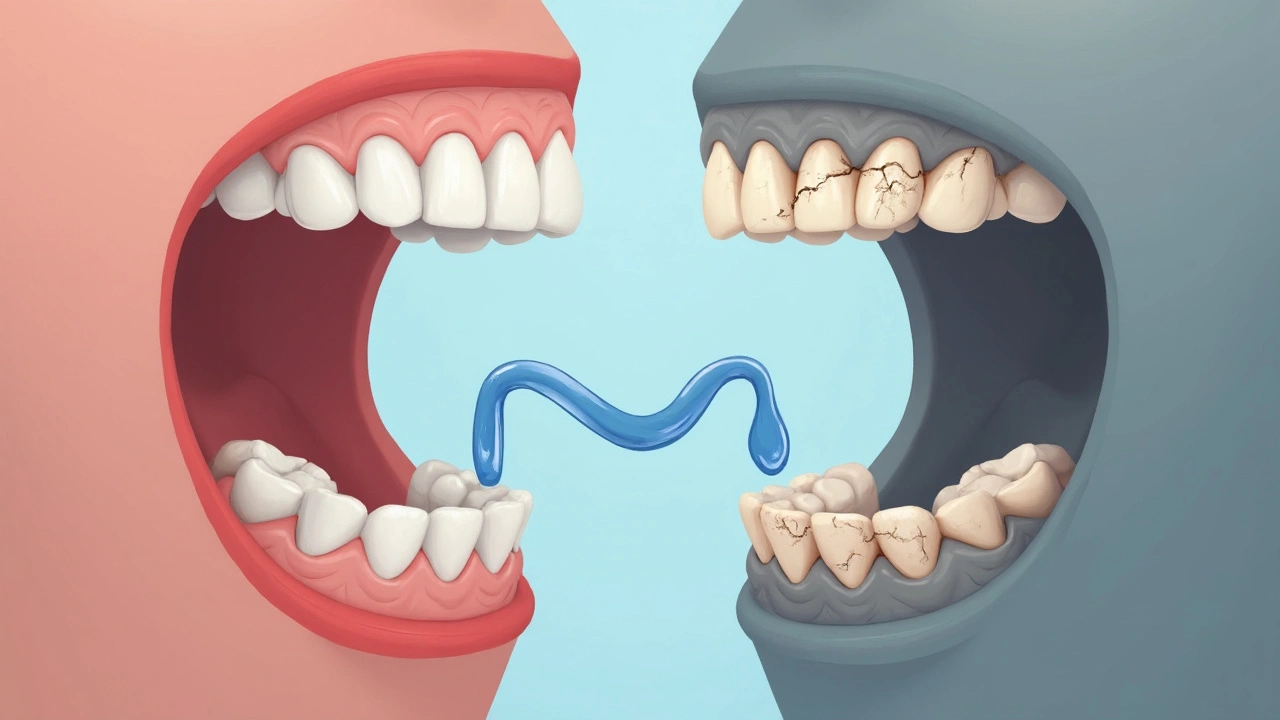Oral Health: Practical Tips for a Healthy Smile
Good oral health isn’t just about a white grin – it’s linked to overall wellness, confidence, and even how you feel each day. The good news? Keeping your mouth in shape takes just a few minutes and a bit of consistency. Below you’ll find the habits that really work, the foods that protect your teeth, and clear signs when you should book a dentist appointment.
Everyday Habits That Keep Teeth Strong
First up, brush like you mean it. Aim for a soft‑bristled toothbrush, a pea‑sized dab of fluoride toothpaste, and two minutes twice a day. The timer trick works – set a song or use a phone timer for 120 seconds and make sure you hit every surface, including the tongue.
Flossing feels like a chore, but it’s the fastest way to remove plaque between teeth where a brush can’t reach. If traditional floss feels awkward, try floss picks or a water flosser. Consistency beats perfection; even a quick once‑a‑day pass does the trick.
Rinse with an alcohol‑free mouthwash if you want extra protection against bacteria. Look for ingredients like cetylpyridinium chloride or essential oils – they calm breath and help keep plaque in check without burning the mouth.
Watch your snacking habits. Sipping sugary drinks or munching on sticky candy gives bacteria constant fuel, leading to acid attacks that erode enamel. If you do indulge, rinse with water afterward or chew sugar‑free gum to kick up saliva, which naturally neutralizes acid.
Hydration matters. Water washes away food particles and keeps saliva flowing, and saliva is your mouth’s built‑in cleaning system. Aim for at least eight glasses a day, and consider a fluoride rinse if you live in an area with soft water.
When to See a Dentist and What to Expect
Regular check‑ups are the backbone of preventive care. Most dentists recommend a visit every six months, but if you notice any of these signs, book an appointment sooner:
- Persistent bad breath that brushing can’t fix.
- Bleeding or swollen gums during flossing.
- New or worsening tooth sensitivity to hot, cold, or sweet foods.
- Visible holes, cracks, or dark spots on teeth.
- Pain that lasts longer than a day after an injury or dental work.
During a routine visit, the dentist will clean away tartar, take X‑rays if needed, and check for early signs of decay or gum disease. They’ll also talk about any medications you’re on that could affect your mouth – for example, certain antihypertensives can cause dry mouth, and some antibiotics can lead to fungal overgrowth. If you’re on a drug like fluoxetine or a steroid, ask how it might impact oral health.
After the cleaning, you’ll get personalized advice. Maybe you need a fluoride varnish for extra protection, or a night guard if you grind your teeth. Some patients benefit from sealants on molars, especially if they have deep grooves prone to cavities.
Remember, oral health isn’t a one‑size‑fits‑all routine. Adjust your habits if you notice changes, and don’t shy away from asking your dentist about anything that feels off. A quick chat can prevent a small issue from becoming a big, costly problem later.
Keeping your mouth healthy is a mix of daily care, smart food choices, and timely professional help. Follow these steps, stay aware of warning signs, and you’ll enjoy a stronger smile and better overall health for years to come.

Ever wondered why your mouth feels dry sometimes? It’s more than just thirst. Saliva plays a huge part in keeping our mouths healthy. Without enough saliva, our teeth and gums can suffer, leading to increased dental issues. Understanding how saliva affects oral health can keep you smiling comfortably.
- Read More
